Winds of Change
Climate and Culture
When He uttereth his voice, there is a multitude of waters in the heavens, and He causeth the vapours to ascend from the ends of the earth; He maketh lightnings with rain, and bringeth forth the wind out of his treasures. Jeremiah 10:13
People made and left for posterity records of unusual weather since the time immemorial. Pliny, Cato, Columella, Varro, Palladius and Vergil write about the weather in connection with agriculture; Procopius of Caesarea in connection with war.
Some seacoast nations were more susceptible and attentive to bad weather: that’s where the elements of the earth and water come into contact. Historical chronicles describe great famines of the fourteenth and seventeenth centuries caused by bad weather, failed crops, severe winters, and unusually cold summers, in which people saw apocalyptic signs.
The Scripture is also quite clear about the source of catastrophic weather—drought, flood, famine, thunderstorms and earthquakes. In our collections we have a large number of old British pamphlets filled with sermons on different subjects; some treat disastrous weather as God’s judgment. You can see in our display several British sermons of the eighteenth and nineteenth century, as well as Melville’s Moby Dick, open to Father Mapple’s sermon on the Book of Jonah, who was on board the ship that suffered a catastrophic storm, with the well-known story that followed; a magnificent edition of the Pennyroyal Bible, and surprisingly amusing interpretation of the aurora borealis by German astrologer Peter Creutzer.
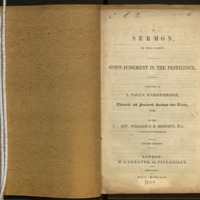
William J. E. Bennett (1804-1886). A sermon in two parts: God's judgment in the pestilence. London: W.J. Cleaver, 1849 ([London]: Richards). Rare BT180.J8 B46 1849
William Bennett was an Anglican priest, known for having provoked the decision that the doctrine of the Real Presence was a dogma not inconsistent with the creed of the Church of England. He is the author of a large number of theological works and sermons. This sermon is on the Great Famine of the 1840s in Ireland caused by failed crops.
Many famines are precipitated by natural causes, such as drought, flooding, unseasonable cold, typhoons, insect infestations, and plant diseases such as the blight that caused the Irish Potato Famine. Beginning in 1845 and lasting for six years, this famine killed over a million people in Ireland and caused another million to flee the country.
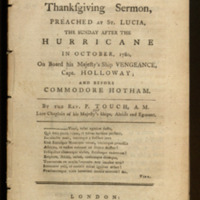
P. Touch. A thanksgiving sermon: preached at St. Lucia, the Sunday after the hurricane in October, 1780, on board His Majesty's Ship Vengeance, Capt. Holloway, and before Commodore Hotham. London: Printed for the author, 1784. Rare BT160 .T68 1784
The Great Hurricane of 1780 was the deadliest Atlantic hurricane on record. Between 22,000 and 27,500 people perished. On Saint Lucia, rough waves and a strong storm tide struck the fleet of British Admiral Rodney at Port Castries, with one ship destroying the city's hospital by being lifted on top of it. The hurricane destroyed all but two houses at Port Castries. By far the worst losses in the British fleet, however, were among the squadron of Rear-Admiral Joshua Rowley, which was caught at sea by the hurricane. Ships of the line HMS Thunderer, which foundered with all hands, and HMS Stirling Castle, which was smashed on the coast with fewer than 50 survivors, were lost; and the remaining six ships were all severely damaged. Witness reports in Saint Lucia claimed that even sturdy stone buildings and forts were completely lost to the wind, with heavy cannons being carried hundreds of feet inland.
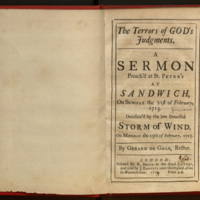
Gerard De Gols (active 18th century). The terrors of God's judgments: a sermon preach'd at St. Peter's at Sandwich, on Sunday the 21st of February, 1713: occasion'd by the late dreadful storm of wind, on Monday the 15th of February, 1713. London : Printed for R. Smith ... and sold by J. Roberts ..., 1714. Rare BT162.S7 D45 1714
The sermon by Rev. Gerard De Gols, rector of St. Peters’ church in Sandwich, is on the religious aspects of storms and tempests, and on the concept of Judgment of God. It was read a week after the devastating storm swept through Sandwich, causing significant damage to its harbor and town. De Gols reminds his parishioners that while the memory of that “dire night was fresh on the minds of men, whilst the wounds were bleeding, whist the calamities were before their eyes,…no doubt men …humbled themselves; but alas, when the storm was over,… men forgot their humiliation, and returned to their former sinful course.”
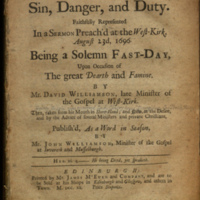
David Williamson (1636- 1706). Scotland's sin, danger, and duty: faithfully represented in a sermon preach'd at the West-Kirk, August 23d, 1696: being a solemn fast-day upon occasion of the great dearth and famine. Rare BT162.F3 W54 1720
Four years of failed harvests (1695, 1696, and 1698–99) resulted in severe famine and depopulation, particularly in the north of Scotland. Starvation killed 5 to 15 percent of the Scottish population, but in areas such as Aberdeenshire, death rates reached 25 percent.
Rarely has a natural disaster had such wide-ranging historical consequences as did the famine that struck Scotland in the mid-1690s. Little more than a decade later, as Scotland’s social elites despaired about their nation’s grinding poverty and profound structural weakness, the country’s Parliament finally voted away its age-old independence in favor of unification with England, previously Scotland’s bitterest and most enduring enemy.
The author of this sermon was a very colorful figure. A Scottish Presbyterian minister denounced as a rebel in 1674, he was restored next year but arrested again the following February. Later he was arrested for refusing to pray for the Prince of Wales, but again released. His matrimonial adventures were no less robust than his professional career. He was married seven times and fathered at least nine children.
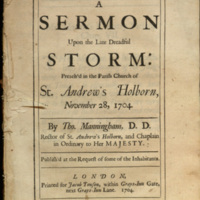
Thomas Manningham (1651?-1722). A sermon upon the late dreadful storm: preach'd in the Parish Church of St. Andrew's Holborn, November 28, 1704. London: Printed for Jacob Tonson, 1704. Rare BT145 .M36 1704
Thomas Manningham was an English churchman. He was consecrated bishop of Chichester on 13 Nov. 1709.
From Daniel Defoe’s The Storm: or, a Collection of the Most Remarkable Casualties and Disasters Which Happen’d in the Late Dreadful Tempest, both by Sea and Land (1704): “We have reckoned, including the City of London, about 123 People kill’d; besides such as we have had no account of; the Number of People drowned are not easily Guest; but by all the Calculations I have made and seen made, we are within compass, if we reckon 8000 Men lost, including what were lost on the Coast of Holland, what in Ships blown away, and never heard of, and what were drowned in the Flood of the Severn, and in the River of Thames.”
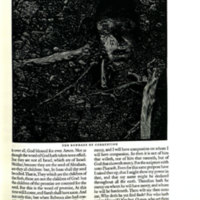
The Holy Bible: containing all the books of the Old and New Testaments. North Hatfield, Massachusetts, New York, Pennyroyal Caxton Press, 1999. Rare Vault BS185 1999 .N67 1999
The Pennyroyal Caxton Bible was designed and illustrated by Barry Moser, who spent four years crafting the 232 relief engravings, his magnum opus. The Pennyroyal Caxton Bible was the first Bible fully illustrated by one individual since Gustave Doré’s La Sainte Bible of 1865.
This bible was printed by Bradley Hutchinson and Harold McGrath in North Hatfield, Massachusetts, in a limited edition. It is the gift of Bruce and Suzie Kovner.
“Flood is coming” is one of the most striking works of Barry Moser.
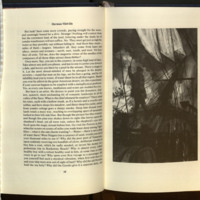
Herman Melville (1819-1891). Moby-Dick: or, The whale. Franklin Center, Pa.: Franklin Library, 1984. Rare PS2384 .M6 1984
Moby Dick, a novel by Herman Melville about the voyage of the whaling ship Pequod, was published by Harper & Brothers in New York in November 1851. Moby Dick is now considered one of the greatest novels, a classic of American literature. Herman Melville was born in New York City in 1819 and as a young man spent time in the merchant marines, the U.S. Navy and on a whaling ship in the South Seas. The book draws on Melville's experience at sea, and on literary inspirations including Shakespeare and the Bible.
Father Mapple's sermon on the Book of Jonah is one of the hinge points of the novel, which is full of descriptions of severe, catastrophic storms.
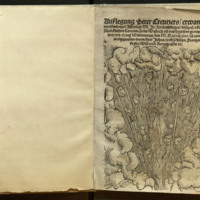
Creutzer, Peter. Ausslegung Peter Creutzers etwan des weytberümpte[n] Astrologi M. Jo. Liechtenbergers discipel, uber den erschröcklichen Cometen: so im Westrich un[n] umbligenden Grentzen erschinen am .xi. Tag Weinmonats, des M.D.xxvii. Jars. [Nuremberg]: [G. Wachter], [1527]. Rare QC971.7.G3 C7 1527
In the 6th century bce, Ezekiel, a prophet-priest of ancient Israel, saw the aurora and wrote that "…a whirlwind came out of the north, a great cloud, and a fire enfolding itself, and a brightness was about it, and out of the midst thereof as the color of amber, out of the midst of the fire." (Ezekiel 1:4). In the British Isles, the Northern Lights were known as the "nimble men" or the "merry dancers," names belying the fact that auroras were seen as clans at war, and the red light as blood spilt in violent battle. In the sixteenth century, the Northern Lights most often were viewed with fear and reverence, and were related to contemporary concepts of Heaven and Hell.
Peter Creutzer attempts to explain the phenomenon of aurora borealis as a comet with three stars in the middle, surrounded by clouds, and enlivened with heads, tongs, and swords.
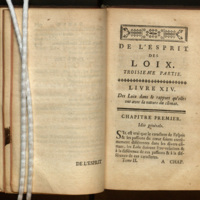
Charles de Secondat, Baron de Montesquieu (1689-1755). De l’esprit des lois. Genève: Chez Barrillot et fils, 1751. Rare JC179 .M72 1751 2
Read online
De l’esprit des lois, or On the Spirit of the Laws, is most famous for Montesquieu’s theory of the separation of powers, but the work also covers the influence of climate on human society. Working from the observation that “the spirit and the passions of the heart differ in the extreme in different climates,” Montesquieu argues that laws should take into account these differences in temperament, making them ultimately dependent (at least in part) on climate.
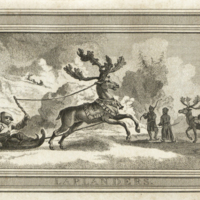
John Trusler (1735-1820). The Habitable World Described. London: Printed for the author, 1788-1797. Rare G114 .T87
John Trusler’s The Habitable World Described, published in twenty volumes, purports to cover “the present state of the people in all parts of the globe, from north to south” including the “situation, extent, climate, productions, animals, &c. of the different kingdoms and states.” Largely a compilation of earlier sources, Trusler’s work does include descriptions of the climate in various parts of the world, as well as discussion of its impact on the local inhabitants. The work also includes a number of illustrations showing the dress, means of transport, and recreational activities adopted by people in different climates. The pages on display show Laplanders traveling by reindeer-drawn sled and Russians tobogganing on an ice-hill.